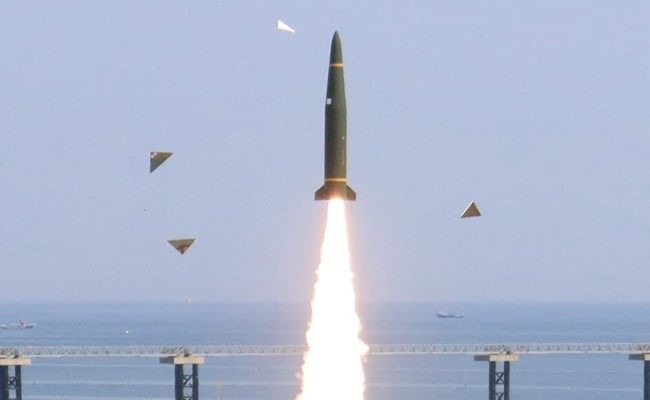| Translate This News In |
|---|
As Seoul, Tokyo, and Washington step up cooperative military manoeuvres to challenge Pyongyang, North Korea launched two ballistic missiles early on Saturday, according to the South Korean military. This was the nuclear-armed nation’s fourth launch this week.
Just days after Washington and Seoul’s navies conducted significant exercises in the waters off the peninsula, South Korea, Japan, and the US held anti-submarine manoeuvres on Friday—the first in five years.
On a trip intended to emphasise her nation’s “ironclad” commitment to South Korea’s defence against the North, US Vice President Kamala Harris visited Seoul on Thursday and saw the heavily guarded Demilitarized Zone that separates the peninsula.
As long-stalled negotiations continue, Pyongyang has stepped up efforts to develop its prohibited weapons programmes, executing a record-breaking flurry of tests this year and amending its laws to designate itself as a “irreversible” nuclear power.
The Joint Chiefs of Staff of Seoul claimed in a statement that the launches were “a major provocation” and that the missiles “flew approximately 350 km (217 miles) at an altitude of 30 km at speed of Mach 6.”
Tokyo verified the launch as well, stating that the missiles had come to rest outside of Japan’s exclusive economic zones.
Vice-minister of defence for Japan, Toshiro Ino, stated that the missiles “appear to have flown in unusual trajectories.”
The missiles’ erratic trajectories, according to experts, show that they can manoeuvre while in flight, making them more difficult to monitor and intercept.
The latest launch, according to the US Indo-Pacific Command, “highlights the destabilising impact of the DPRK’s illicit WMD and ballistic missile programmes,” to use North Korea’s official acronym.
Harris journey
Harris’s visit to Seoul was commemorated by North Korea with a flurry of missile launches, including a test just hours after the vice president’s flight departed of South Korea on Sunday, Wednesday, and Thursday.
In order to help defend South Korea from the North, Washington has 28,500 soldiers stationed there.
The two nations have increased joint exercises, which they stress are solely defensive, under President Yoon Suk-yeol of South Korea, who took office in May.
Just before Harris landed in Seoul, Washington dispatched the nuclear-powered USS Ronald Reagan aircraft carrier to South Korea to perform a sizable combined naval drill as a show of force against Pyongyang.
North Korea is enraged by such exercises because it perceives them as invasion drills.
Leif-Eric Easley, a professor at Ewha University in Seoul, stated that North Korea’s short-range ballistic tests “are less critical than a nuclear test but still violate UN Security Council resolutions,” adding that the timing was “provocative”.
The US-China conflict and Russia’s annexation of additional Ukrainian territory, he claimed, are dividing the world, and North Korea is “rapidly modernising weapons and exploiting that.”
“Pyongyang’s actions once again make plain the need for Washington and Seoul to strengthen military deterrence, tighten economic sanctions, and deepen policy coordination with Tokyo,” he continued.
Nuclear test coming up?
A nuclear test by North Korean leader Kim Jong Un is imminent, according to South Korean and US officials who have been issuing warnings for months.
The next nuclear test by North Korea could occur between the US midterm elections on November 7 and the forthcoming party conference in China on October 16, according to the South’s spy service on Wednesday.
With meticulous timing, North Korea, which is subject to numerous UN sanctions for its nuclear programmes, normally aims to maximise the geopolitical impact of its tests.
The isolated regime has conducted six nuclear weapons tests since 2006, the most latest of which took place in 2017.
On Saturday, President Yoon issued a grim warning regarding the dangers of Pyongyang using nuclear weapons against its southern neighbour.
In an address on Armed Forces Day, he declared that North Korea would face a “resolute and overwhelming response” from our military and the partnership between the US and Korea.


















